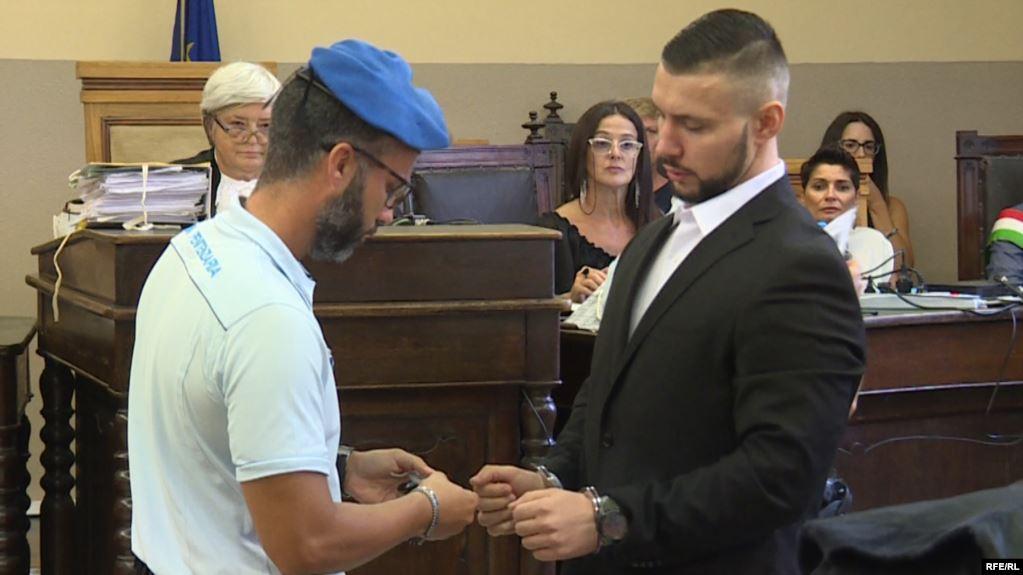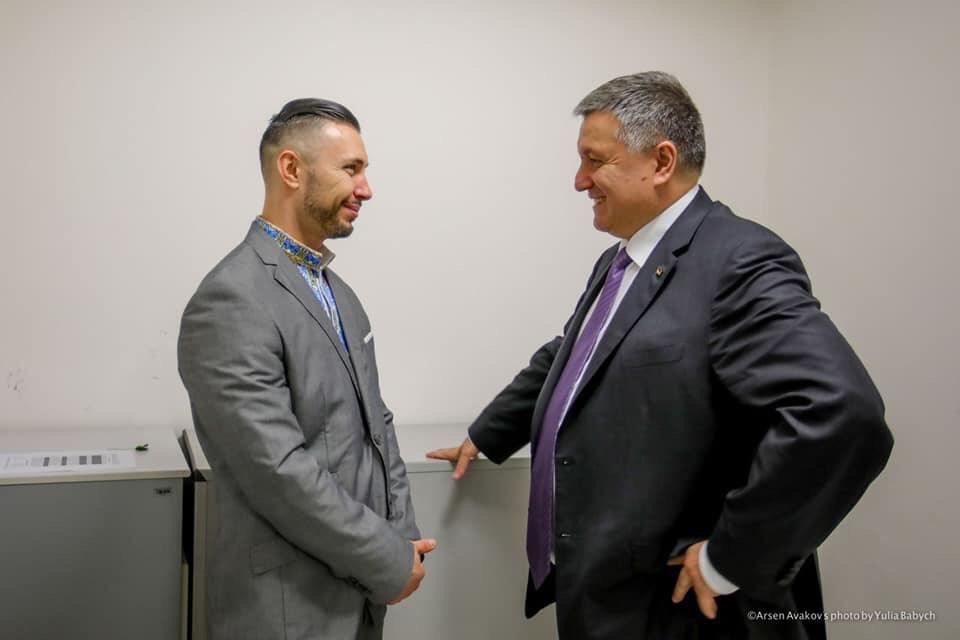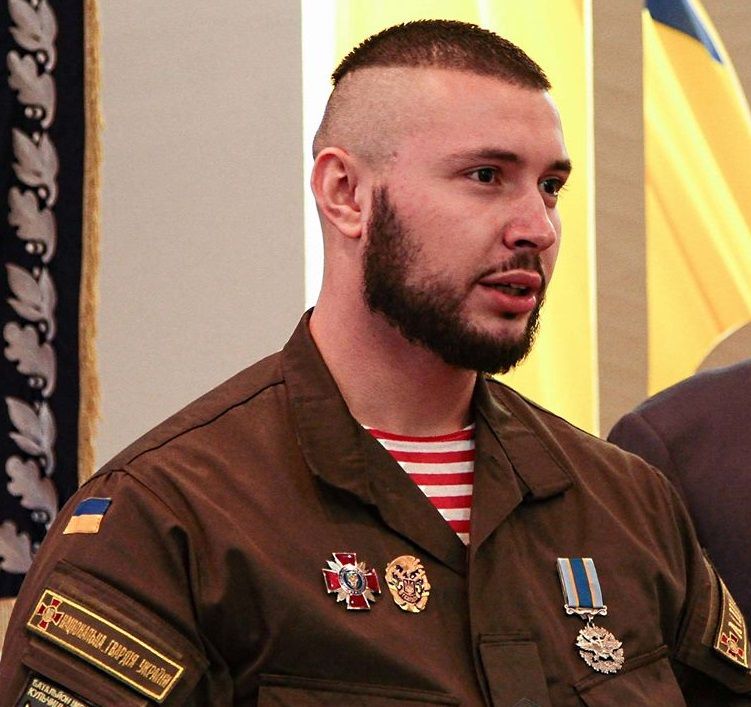
Vitaliy Markiv's case in Italy revealed issues of dual citizenship, legal status of troops in Donbas
Last week, the cruel sentence of the Italian court for the Ukrainian National Guard, ATO veteran Vitaly Markiv, caused a real shock wave. He received 24 years of imprisonment instead of 17 for ... possible complicity in the murder of the Italian photo reporter Andrea Rocchelli in Donbas. The verdict to the Ukrainian military will be appealed, but the Markiv case is not the only trial initiated against the Ukrainian military abroad.
Vitaly Markiv was detained in Italy on June 30, 2017. He flew there to visit his sick mother while on a leave. Prior to the Maidan events, Markiv had long lived in Italy, where he obtained citizenship. At the same time, he also had a Ukrainian passport. During the Revolution of Dignity, he returned to Ukraine and became a participant in the Maidan self-defense forces. Subsequently, the Kulchytsky Battalion, a unit of the National Guard where Markiv became a soldier, was formed from the Maidan self-defense activists. And it was the fighters of this battalion that in 2014 were holding positions at the foot of the Karachun Mountain, near Sloviansk, where the Italian journalist died.
According to the investigation, the journalist was killed in mortar shelling. But the Italian and Ukrainian sides have different versions of what actually happened.
Different perspectives
In particular, Ukraine came to the conclusion that the Italian journalist and his Russian interpreter partner Andrei Mironov were killed in mortar attacks by the militants. This, in particular, is indicated by the statement of the National Guard, according to which, in 2014, the Ukrainian army was not armed with this type of weapon.
At the same time, Italian investigators consider the murder of Rocchelli to be intentional and, in their opinion, it is the Ukrainian military who is guilty. Thus, Italian prosecutor Andrea Zanoncelli is convinced that since Markiv informed the commanders of the National Guard about the movement of civilians in the Karachun area, after which the National Guard signaled the Armed Forces to open fire, he should be considered an accomplice.
It is curious that, as proof of this version, Italian investigators used a quote from an article in the local press. Journalist Illaria Morani wrote in her piece that Markiv spoke with another Italian journalist, Marcello Fauci, and allegedly uttered the phrase: "Usually we don't shoot in the direction of the city and at civilians, but when we see movement, we load heavy artillery. It happened so with the car of two journalists and an interpreter." This phrase, allegedly recorded by Morani, when Fauchi was talking to Markiv on the speakerphone, was the pretext for the arrest of the Ukrainian troop. Although none of the participants in the conversation confirmed the quote.
Anyway, in July 2018, a criminal case was opened against Markiv in Italy, on the basis of a number of journalistic publications in the local press about the late Rocchelli, and a trial started...
Markiv’s defense insisted on the innocence of a Ukrainian troop. His lawyer, Rafaele Dela Valle, claims that Markiv is an ordinary soldier who did not operate heavy weapons, while the late journalists were victims of crossfire and no one shot them deliberately.
However, the main witness for the prosecution – the Frenchman William Roguelon, who survived the shelling on Karachun, said that it was the Ukrainian military who fired mortars. Although his colleague, who also was with him in Donbas, another French journalist Paul Gogo, who knew firsthand what and how was happening in those days around Karachun, for some reason was not questioned as a witness.
"I was in Donetsk, I lived there with the injured Frenchman. He called me at the time of the shelling, I called the embassy [the Italian and French Embassy] to tell them that something was happening. His seriousness has never been questioned, although he clearly played a role in the course of this drama. But Italy seems to have completely failed the investigation," he said, stating that he was ready to be a witness during the appeal.
Gogo noted that Markiv was convicted based on "false testimony" and under pressure from journalists' trade unions.
However, it is worth noting that foreign journalists were staying in the uncontrolled territory of Ukraine illegally, without having any permits from the Ukrainian authorities to stay in the ATO zone. Therefore Ukrainian military could not be aware of the fact that they were there.
Ex-Deputy Minister of Information Policy, an expert on strategic communications of the Information Security State Association Tetiana Popova notes that the first press-cards issued by the ATO Headquarters were introduced in December 2014 and, until that time, all journalists (both Ukrainian and foreign) had traveled to the ATO zone and uncontrolled part of Ukraine at their own risk.
"The accusations against Markiv appeared after the Russians began to work out a narrative that Ukrainians are persecuting international journalists. In particular, after March 2016, when the Peacemaker website published a list of journalists as enemies of Ukraine," reminds Popova.

Trumped up case
A cruel sentence, 24 years instead of 17, which was initially requested by the prosecutor, caused outrage in Ukraine. Interior Minister Arsen Avakov, who during the trial testified in favor of the detained guardsman, said that the court’s decision would be appealed. "Our Guardsman and the state of Ukraine are not to blame for the death of reporter Rocchelli. He was the victim of an aggressive Russia, which launched in Sloviansk a war in Donbas. We will continue fighting," Avakov wrote on Twitter.
But, according to Markiv's lawyer, the appeal is not a quick matter, and the ruling may be handed down only in the spring of 2020. This is due to the fact that the sentence was pronounced without the motivational part, which in Italy could be announced 90 days after the hearing. Only then will it be possible to appeal it.
To speed up this process, President Volodymyr Zelensky ordered the leadership of the Ministry of Foreign Affairs and the Prosecutor General’s Office of Ukraine to urgently address the issue of the return of the guardsman to Ukraine.
"I'm asking you to forget about political discord between the new government and the leaders of these agencies that have not been replaced and to make every effort to return the former Kulchytsky National Guard Battalion troop Vitaly Markiv to Ukraine. Until then, I instruct Ukrainian diplomats in Italy to be constantly in touch with our veteran," Zelensky said.
In addition, last Friday, outside the Italian embassy in Kyiv, more than a hundred people - fighters of the National Corps and ordinary citizens - gathered for an action in support of Markiv, demanding the release of the Ukrainian fighter. Activists brought to the embassy doors a large banner saying "FreeMarkiv" and empty pizza boxes.
"This man was defending his country, and no other country can judge our citizen for something committed on the territory of Ukraine," said Roman Lavitsky, one of the protesters.
ATO fighter Myroslav Hai, who was deployed alongside Markiv on Mount Karachun, argues that in the Italian case there is not a single piece of evidence: "There cannot be any. Because he could not spot mortar fire, he could not shoot from a mortar and even from an automatic rifle. It was unfeasible and we did not even have such an opportunity. So the entire charge is trumped up."
As Myroslav Hai said, Markiv was a sergeant at that time and could not give any orders about shooting in the direction of journalists. Especially using mortars...
"We were deployed in the village of Andriyivka near Sloviansk, and our task was to support the 95th Airborne Assault Brigade. We were attacked by separatist forces. These were the Russians. They blocked our convoy and showed their passports. They tried to hinder our movement there until the evening, and then we had our first combat. After that, we broke through to Karachun and held positions throughout all the time that we had. At the time, we even lacked water and field rations, not to say mortars. We didn’t even take socks and backpacks – we were deployed there for 1-2 days, to support the 95th Brigade. But it turned out that we got stuck there. We couldn't even finish shoot to reach that crossing with our rifles –– it was two kilometers to it, it was blocked by a train, which the terrorists specially put there to block the path to Sloviansk for our convoys. You couldn't even see well in binoculars; I'm not even talking about shooting there," said Myroslav Hai.

Risks to military
"Markiv's sentencing is a very bad signal and it may indicate that, perhaps, the Russian Federation today is gaining influence over government institutions in the EU member states. This cannot be denied, since we know that Russia has been funding a lot of political movements in European countries," said one of the protesters, Odesa-based activist Serhiy Sternenko.
Olha Reshetilova, coordinator of the Media Initiative for Human Rights, notes that as of March of this year, at least ten Ukrainian servicemen have been detained in European countries after being put on Interpol wanted list by Russia.
"Russia would file warrants to put people on an Interpol wanted list on charges non-related to hostilities, since Interpol doesn't do search on charges related to war and politics. That is, they are mostly detained for weird criminal cases and then must be handed over to Russia. So far, there has not been a single case of such transfer, but there have already been detentions at the request of the Russian Federation," she notes.
According to her, in addition to citizens of Ukraine, foreign nationals who served in Ukrainian Army ranks in Donbas are also at risk.
"In 2016, Petro Poroshenko issued a decree that allowed foreigners to serve in the Armed Forces on a contractual basis. But they weren't granted Ukrainian citizenship for a long time. The fact is that in the post-Soviet countries people on military service which is not in the interests of their home country are considered mercenaries. Criminal cases are opened against such citizens in their home countries. We have a precedent with a citizen of Belarus, a fighter of one of the mechanized brigades who has served for a quite a long period but never obtained citizenship. His mom got sick and he was forced to come visit her. He was immediately detained and has already been sentenced. What to do about it, we don't know. Authorities are now ready to grant him citizenship, but it is necessary that he personally write the application, but there is no access to him," says Reshetilova.
As for the case of Vitaly Markiv, one of the problems is dual citizenship.
"Italy also considers him its citizen. Because of this, the claims of Ukraine look very relative. And this complicates the negotiations," the expert notes.
In this regard, in anticipation of the appeal in the case of Vitaliy Markiv, Ukraine should pay attention to the two issues that everyone previously tried to close turn a blind eye to. First, at the state level, it is high time to determine the legal status of combatants. The thing is that, de facto, the war is underway, but de jure. there's no war.
Secondly, it's dual citizenship. Despite the fact that Vitaliy defended Ukraine as a Ukrainian national, the Italian court sentenced him as an Italian citizen. Indeed, in Europe there are thousands of Ukrainians who obtained EU citizenship, but never gave up on their Ukrainian passports.
And if the trend towards strengthening Russian influence in Europe prevails, persecution of the Ukrainian military risks becoming everyday practice.
Anastasia Zaremba

